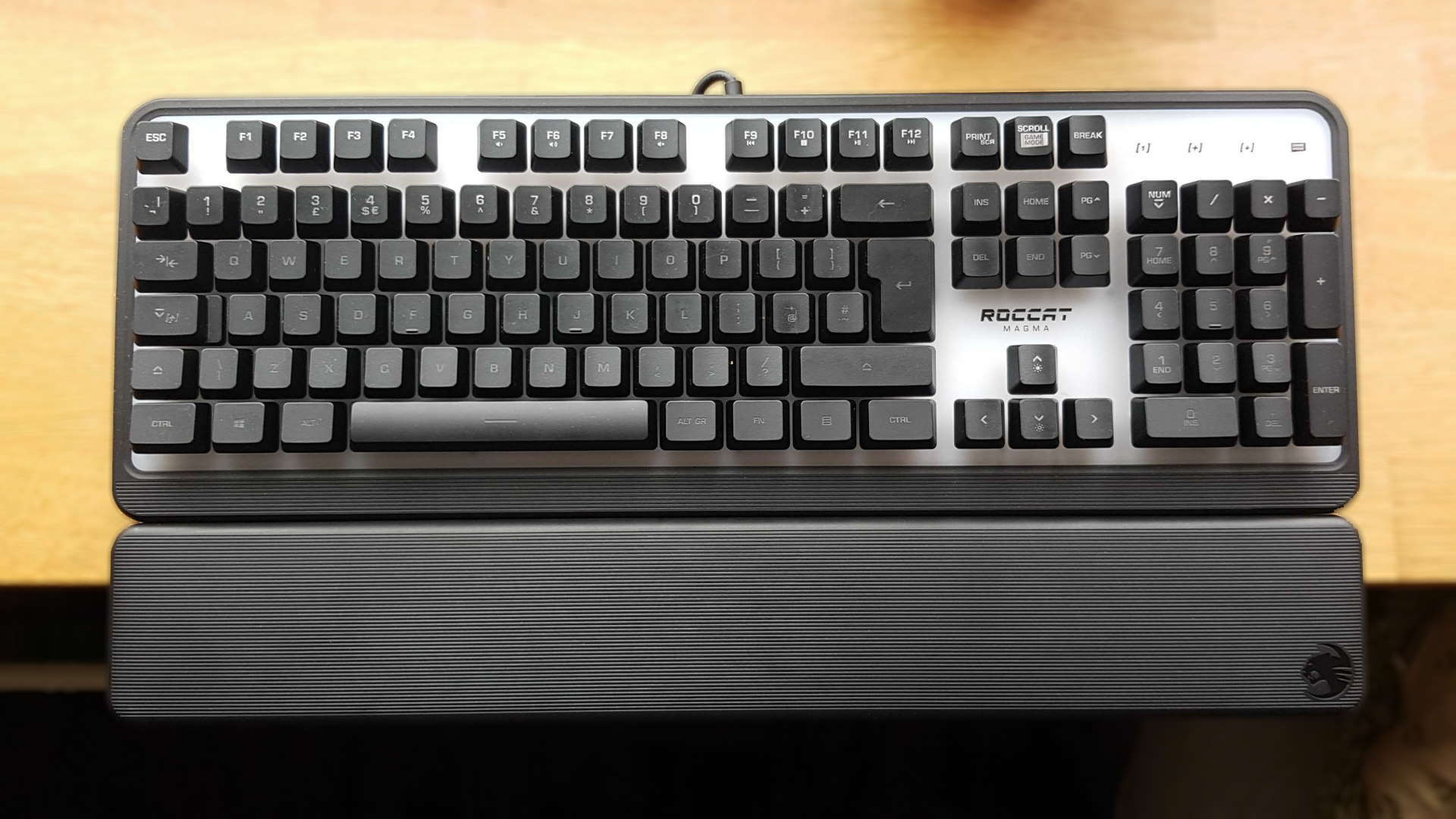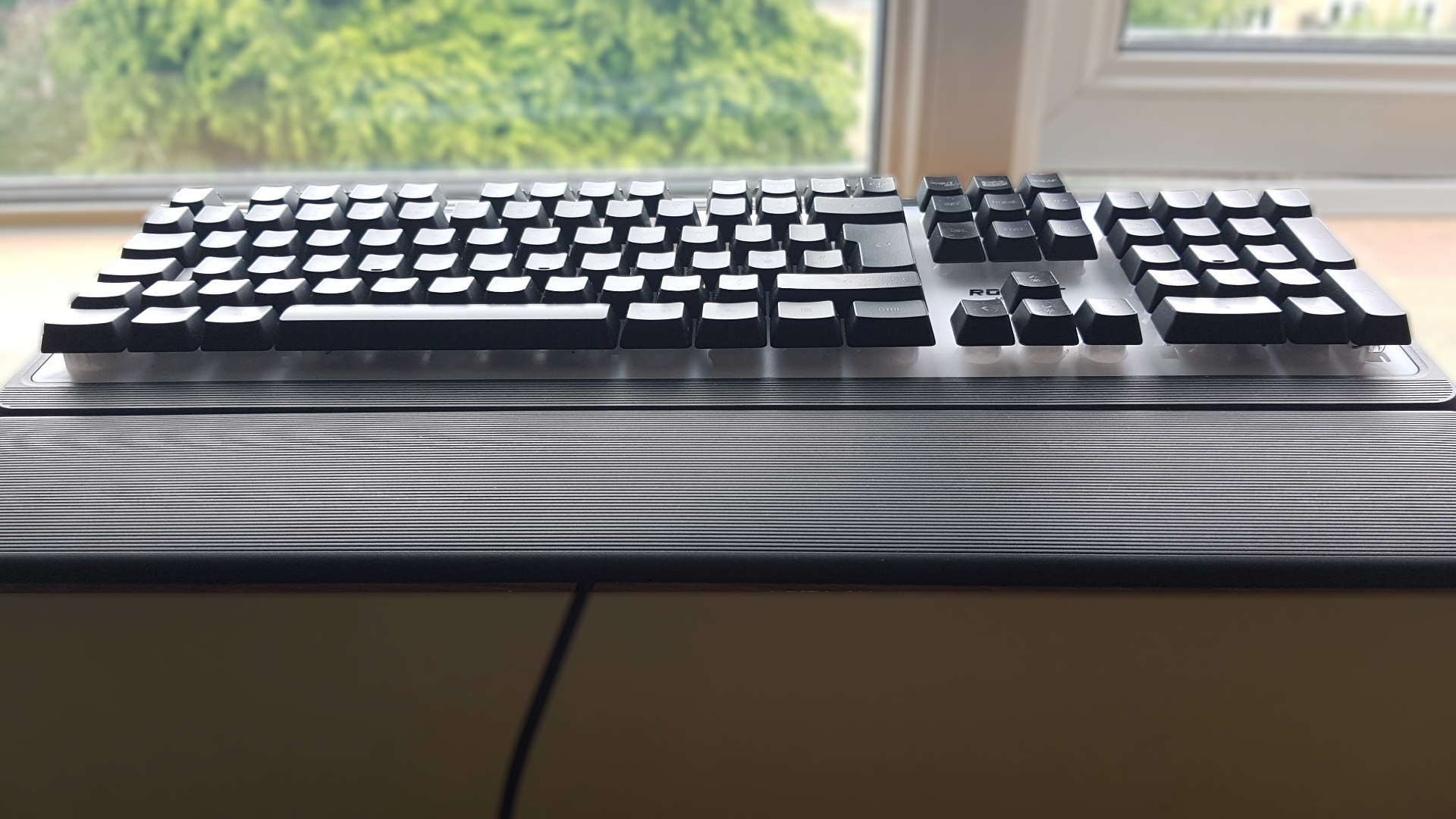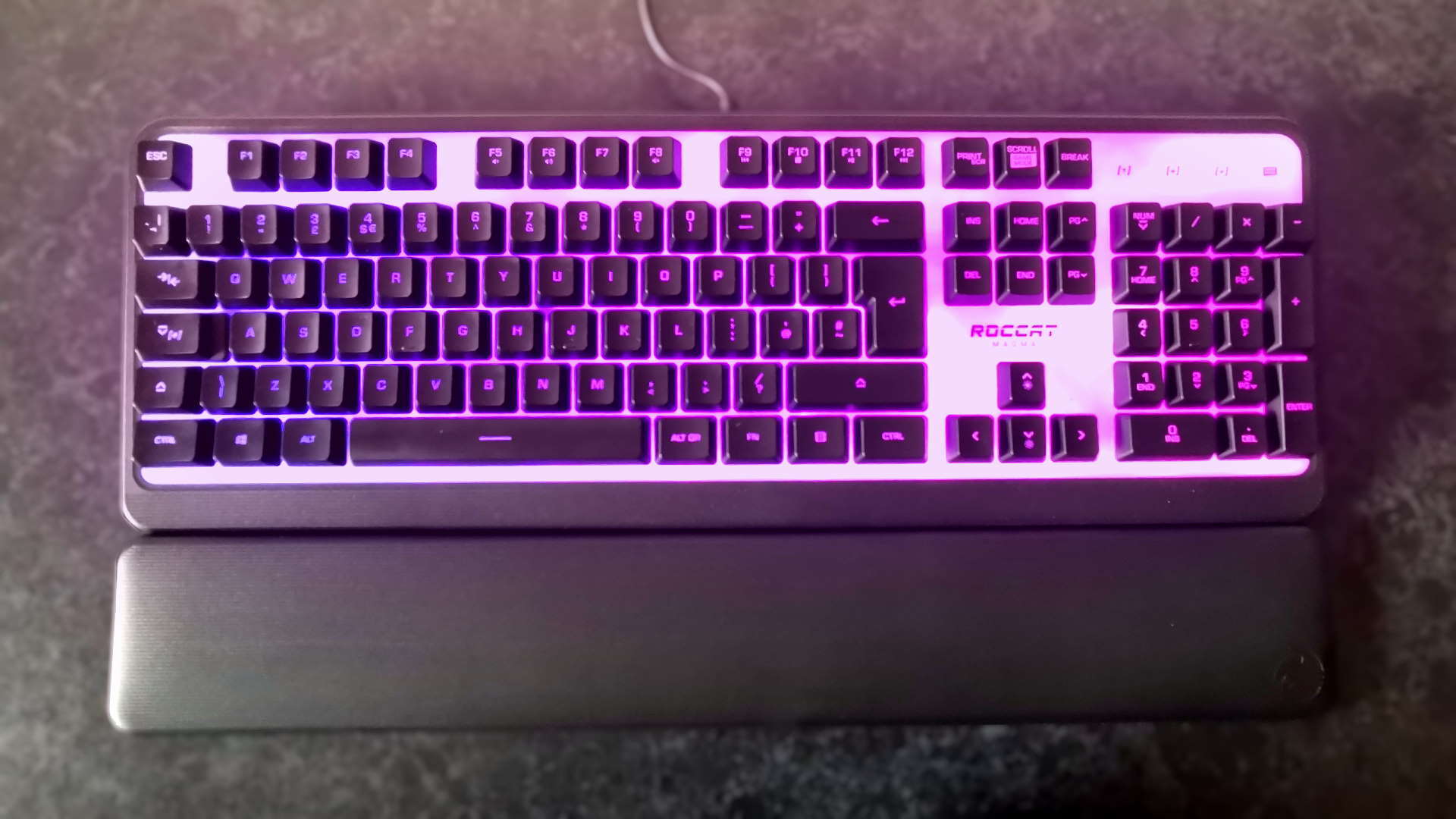Our Verdict
The Roccat Magma is worth the price tag. Despite its minor downfalls, it's a hard membrane to beat and everything a competitive gamer on a budget could need.
For
- Nicely tactile for a membrane board
- Unique RGB top plate design
- Anti-ghosting and 26-key rollover
- Silent as a silent thing
Against
- RGB cycle isn't very smooth
- Not the sturdiest board
- Wrist rest not cushioned
PC Gamer's got your back
The Roccat Magma membrane keyboard reminds me that a gaming keyboard doesn't have to be expensive, or even mechanical, to keep you at the top of your game. I've been thoroughly impressed by the tactility of the rubber dome switches, the unique RGB top plate design, and great features for competitive gaming. All underlined by an affordable price for a trustworthy brand. That's a rare thing, and though it may not be as sturdy as some boards, nor as full of fancy greebles, it's a (literal) beacon of excellence among membrane gaming keyboards.
It's a board for flashy, '80s retro aesthetic enthusiasts who're looking to do some competitive gaming for cheap.
Recently, Roccat seems to have been shaking things up in terms of where lighting should belong on peripherals, exemplified in the Magma's uniquely lit design.
Much like the hex-laden, under-finger lighting of the Roccat Kone Pro Air mouse, the Magma houses its RGB LEDs in previously unexplored places.
With a membrane, there's no per-key lighting. Instead, Roccat has opted for 5 separately configurable lighting zones that span the entire top plate, behind the key caps. The obvious drawback is that there's less potential for intricate customisation—those who prefer W, A, S and D to glow a different color, for example, will be disappointed. The zoned RGB design does still offer some room for nice gradients and effects, but the cycle isn't as smooth as it could be, and colours aren't super accurate.
The minimal use of LEDs within the board does mean less coverage, too, resulting in some slightly darker patches where a few key caps' lettering looks a bit dim. It's not hugely noticeable, though. There are a few obvious blemishes under the top plate that may detract from the design for some—little black spots where the board is joined together— but I think Roccat was going for a kind of 'naked look' with the milky white translucence. Very cyberpunk, but not to my personal taste.
Switch: Rubber dome, Membrane
Size: Full size
Backlights: 5 zone RGB
Passthroughs: No
Media controls: Function keys
Wrist rest: Yes, hard plastic
Price: $60 (£50)
With the entire face illuminated, when dust shows up, it really shows up. Thanks to the raised plastic housing under each key cap, and lack of mechanical, dust-trapping faff, that doesn't translate to a huge issue—a hard blow should see you right (wow, it really is an '80s throwback).
Besides, you'll have more reason to keep your keyboard clean and show it off. Being quite eye-catching compared to your standard under key lighting, you're sure to win praise from your RGB-loving friends. And with it being a Roccat product, you get to play with the Aimo lighting feature to sync lighting across your peripherals.
There are some other interesting features in the Roccat Swarm software, too. These include the (slightly gimmicky) option to add sounds to your key presses, such as a typewriter, or some laser beam pew-pews. Those are fun to play around with, sure, but the most practical feature comes in the form of Roccat's Easy Shift key assignment. Not all the keys are assignable, but there's a huge list of potential actions for each one that is.
The Magma's non-mechanical nature means that—although the key caps do come off for easy cleaning—you won't be able to jam fancy new key caps onto it like you would a mechanical counterpart. But actually, and I hate to admit this, I really like the rubber dome membrane construction Roccat has used here. It's oddly tactile, with great feedback and actuation, as well as being soft and silent for keeping on your teammates' good side.


The Magma isn't the sturdiest board ever. Compare it to some of the solid, milled metal boards around and there's some minor concern that when you press down on the spacebar with force—the board bows a little. As long as you don't intend to smash the keyboard with your fist, you should be ok. But something to keep in mind: if you're an exceptionally heavy typist, a metal keyboard is a better option.
Otherwise, it's a spectacular looking board. The deeply rounded corners and thick black frame really set it off, and the lettering isn't some overkill, sci-fi typeface. There may not be dedicated media controls, but it's a nifty full size keyboard with function keys and 26-key rollover, as well as anti-ghosting, so it's everything you need for competitive gaming. That's what Roccat was aiming for, and it delivers without breaking the bank. You even get a wrist rest with it, and although it's not spongy, it's a nice bit of support.
The Roccat Magma is a keyboard for gamers who prefer a soft and silent, yet tactile feel from a membrane board, and are happy to have their whole board lit up like a quest item. With its outlandish lighting design choice, it's a board for flashy, '80s retro aesthetic enthusiasts who're looking to do some competitive gaming for cheap. And despite some minor annoyances, such as the RGB colour inaccuracies and a hard wrist rest, it's nothing that can't be overlooked for the $60 (£50) price tag.
The Roccat Magma is worth the price tag. Despite its minor downfalls, it's a hard membrane to beat and everything a competitive gamer on a budget could need.

Screw sports, Katie would rather watch Intel, AMD and Nvidia go at it. Having been obsessed with computers and graphics for three long decades, she took Game Art and Design up to Masters level at uni, and has been rambling about games, tech and science—rather sarcastically—for four years since. She can be found admiring technological advancements, scrambling for scintillating Raspberry Pi projects, preaching cybersecurity awareness, sighing over semiconductors, and gawping at the latest GPU upgrades. Right now she's waiting patiently for her chance to upload her consciousness into the cloud.


